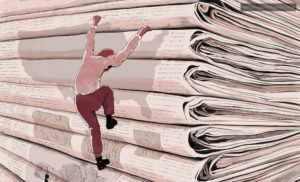liberal arts & journalism
The core of journalism: betrayal.
April 9, 2018BuzzFeed
Ben Smith, BuzzFeed Editor-in-Chief
“This Is What It Was Like Learning To Report Before Fake News Was The Biggest Problem In The World
As a young reporter in Eastern Europe in 2001, I expected to witness the “end of history” and the flowering of democracy. That was just one of the mistakes I made.
—
I recognized myself in Suzy Hansen’s recent book on the delusions of our generation of Americans abroad, Notes on a Foreign Country.
“I would never have admitted it, or thought to say it, but looking back, I know that deep in my consciousness I thought that America was at the end of some evolutionary spectrum of civilization, and everyone else was trying to catch up,” she wrote.
[…]
There’s an axiom in reporting — crystallized by Janet Malcolm in The Journalist and the Murderer — that at the core of journalism is betrayal. I thought that’s what I’d done to Shydlovski. And I’ve thought a lot about the balance of responsibility to your sources and to your readers.
I had left Belarus on an overnight train the day after the election, and crossed the Ukrainian border on the morning of Sept. 11, as clear a day in that region as it was in New York. That afternoon, I sat in a Kiev newsroom watching my past assumptions about American power crumble, and walked outside to watch Ukrainians lining up at exchange bureaus to turn in their dollars. The story moved on.
[…]
Kozak, though, stuck around; he’s still working on the Lukashenko project from his desk in Foggy Bottom. And his own experience, he said, had taught him not to trust confident judgments about the future of an authoritarian.
“You get that blithe assumption that the status quo will always remain — or that this guy is so bad he’s got to go,” he said. “Neither are necessarily true, nor necessarily false.”
And Kozak is right: The main lesson I should have learned was about making predictions, about trusting the confidence of my American culture and of official sources on both sides, of imagining I knew more than I did. Even in the era of Steven Spielberg’s The Post and of a kind of glorification of the work of journalists, good reporting doesn’t offer easy lessons. It’s an uncertain business, and a necessarily anarchic one. Now I’m glad I wrote Shydlovski’s story, not despite the fact that I didn’t know where it would lead, but because of it.”
[full article]
